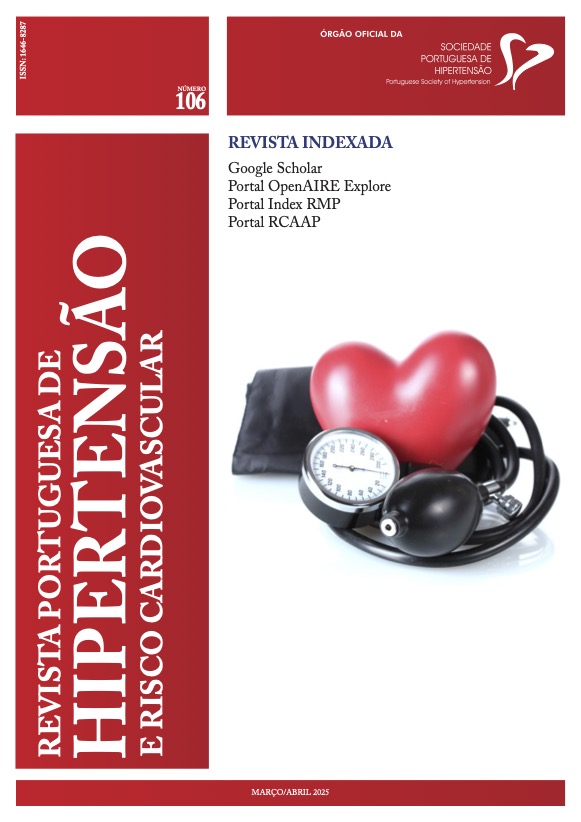THE ROLE OF HEALTH LITERACY IN THE MEDICATION ADHERENCE OF PATIENTS DIAGNOSED WITH HYPERTENSION: AN EVIDENCE-BASED REVIEW
DOI:
https://doi.org/10.58043/rphrc.161Keywords:
Arterial Hypertension, health literacy, medication adherenceAbstract
Introduction: Hypertension (HTN) is the most prevalent cardiovascular disease in the world. Only one in five people with HTN has the disease under control. Medication adherence plays a crucial role in controlling HTN. In a study conducted in 2008, it was found that half of patients discontinued antihypertensive medication within a year.Purpose: Understand the role of health literacy in medication adherence in adults with HTN.
Methodology: In this review, we used the MeSH: “health literacy” AND “hypertension” AND “medication adherence”. We searched for systematic reviews (SR), randomized clinical trials, meta-analyses and articles published between 2013 and 2023, in Portuguese, English and Spanish, in the Cochrane Library and PubMed databases. We applied the PICO methodology - Population: adults (≥18 years old) with HTN; Intervention: health literacy; Comparison: non-intervention; Outcome: medication adherence; The level of evidence and strength of recommendations were assigned based on the SORT (Strenght of Recommendation Taxonomy) classification.
Results: From the initial search, we selected 108 articles, of which 82 were excluded after reading the title or abstract. After fully reading the articles, 9 met the inclusion criteria: two SR and 7 observational studies.
Discussion/Conclusions: Of the 9 studies analyzed, three did not have statistically significant results (n=807), while 6 demonstrated a statistically significant connection (n=4094). The main limitation identified was the use of different scales to assess medication adherence and health literacy. Furthermore, the population evaluated in most studies belongs to minorities and, to date, no studies have been carried out at an European level. According to the review carried out, the evidence points to a positive impact of health literacy on medication adherence (Strength of recommendation B).
Downloads
References
WHO 2021 (http://www.who.int/news-room/fact-sheets/detail/hypertension)
Sabaté E, Sabaté E. Adherence to Long-Term Therapies: Evidence for Action. World Health Organization; 2003.
Vrijens B, Vincze G, Kristanto P, Urquhart J, Burnier M. Adherence to prescribed antihypertensive drug treatments: longitudinal study of electronically compiled dosing histories. BMJ. 2008 May 17;336(7653):1114-7.
Lee HJ, Jang S, Park E. Effect of adherence to antihypertensive medication on stroke incidence in patients with hypertension: a population-based retrospective cohort study. BMJ Open 2017;7:e014486.
Dalal JJ, Kerkar P, Guha S, et al. Therapeutic adherence in hypertension: Current evidence and expert opinion from India. Indian Heart J. 2021 Nov-Dec;73(6):667-673.
Mancia G, Kreutz R, Brunström M, et al. 2023 ESH Guidelines for the management of arterial hypertension. Journal of hypertension. 2023.
Ebell MH, Siwek J, Weiss BD, et al. Strength of recommendation taxonomy (SORT): a patient-centered approach to grading evidence in the medical literature. American family physician. 2004;69(3):548–556.
Lor M, Koleck TA, Bakken S, Yoon S, Dunn Navarra AM. Association Between Health Literacy and Medication Adherence Among Hispanics with Hypertension. J Racial Ethn Health Disparities. 2019 Jun;6(3):517–524.
Park NH, Song MS, Shin SY, Jeong JH, Lee HY. The effects of medication adherence and health literacy on health-related quality of life in older people with hypertension. Int J Older People Nurs. 2018 Sep;13(3):e12196.
Silva ICD, Nogueira MRDN, Cavalcante TF, et al. Health literacy and adherence to pharmacological treatment by people with arterial hypertension. Rev Bras Enferm. 2022 Aug 8;75(6):e20200008.
Guo A, Jin H, Ma J, et al. Impact of health literacy and social support on medication adherence in patients with hypertension. BMC Cardiovasc Disord. 2023 Feb 19;23(1):93.
Al-Ali NM, Telfah RK. The effect of health literacy in explaining medication adherence among patients with hypertension. Int J Nurs Pract. 2023 Jun;29(3):e13136.
Wannasirikul P, Termsirikulchai L, Sujirarat D, Benjakul S, Tanasugam C. HEALTH LITERACY, MEDICATION ADHERENCE, AND BLOOD PRESSURE LEVEL AMONG HYPERTENSIVE OLDER ADULTS TREATED AT PRIMARY HEALTH CARE CENTERS. Southeast Asian JTrop Med Public Health. 2016 Jan;47(1):109–20.
Hall E, Lee SY, Clark PC, Perilla J. Social Ecology of Adherence to Hypertension Treatment in Latino Migrant and Seasonal Farmworkers. J Transcult Nurs. 2016 Jan;27(1):33-41.
Maleki G, Norian R, Moeini B, et al. Factors related to medication adherence in patients with hypertension in Iran: a systematic review study. Blood Press Monit. 2023 Oct 1;28(5):221–235.
Gutierrez MM, Sakulbumrungsil R. Factors associated with medication adherence of hypertensive patients in the Philippines: a systematic review. Clin Hypertens. 2021 Oct 1;27(1):19.
Health Literacy Tool Shed. Newest Vital Sign Spanish Version - NVS-SP [Internet]. 2005 [cited 2018 Jun 12]. Available from: https://healthliteracy.bu.edu/nvs-sp
Baker DW, Williams MV, Parker RM, Gazmararian JA, Nurse J. Development of a brief test to measure functional health literacy. Patient Educ Couns. 1999;38(1):33–42.
Lee SY, Bender DE, Ruiz RE, Cho YI. Development of an easy-to-use Spanish Health Literacy test. Health services research. 2006;41(4 Pt 1):1392–1412.
Haghdoost AA, Rakhshani F, Aarabi M, et al. Iranian Health Literacy Questionnaire (IHLQ): An Instrument for Measuring Health Literacy in Iran. Iran Red Crescent Med J. 2015 Jun 1;17(6):e25831.
Duong TV, Nguyen TTP, Pham KM, et al. Validation of the Short-Form Health Literacy Questionnaire (HLS-SF12) and Its Determinants among People Living in Rural Areas in Vietnam. Int J Environ Res Public Health. 2019;16(18):3346.
Jordan JE, Buchbinder R, Briggs AM, et al. The health literacy management scale (HeLMS): a measure of an individual’s capacity to seek, understand and use health information within the healthcare setting. Patient Educ Couns. 2013;91(2):228-35.
Sun HL, Peng H, Fu H. The reliability and consistency of health literacy scale for chronic patients. Fudan Univ J Med Sci. 2012;39(3):268–72.
Ishikawa H, Takeuchi T, Yano E. Measuring Functional, Communicative, and Critical Health Literacy Among Diabetic Patients. Diabetes Care. 2008;31(5):874–879.
Cronbach LJ. Coefficient alpha and the internal structure of tests. Psychometrika. 1951;16:297–334.
Zeller RA. Measurement Error, Issues and Solutions. In: Kempf-Leonard K, editor. Encyclopedia of Social Measurement. Elsevier; 2005. p. 665–676.
Cortina JM. What is coefficient alpha? An examination of theory and applications. Journal of applied psychology. 1993;78(1):98.
Nguyen TM, La Caze A, Cottrell N. What are validated self-report adherence scales really measuring?: a systematic review. Br J Clin Pharmacol. 2014 Mar;77(3):427-45.
Morisky DE, Green LW, Levine DM. Concurrent and predictive validity of a self-reported measure of medication adherence. Medical care. 1986;24(1):67–74.
Kripalani S, Risser J, Gatti ME, Jacobson TA. Development and evaluation of the Adherence to Refills and Medications Scale (ARMS) among low-literacy patients with chronic disease. Value Health. 2009 Jan-Feb;12(1):118-23.
Sandhya M, Ramesh P, Penupothu N, Naveen G. Assessing adherence to hypertension medications and its impact on blood pressure control: A community-based observational study. Asian Journal of Medical Sciences. 2023;14:61–66.
Jhaj R, Gour PR, Kumari S, Sharma S. Association between medication adherence and blood pressure control in urban hypertensive patients in central India. International Journal of Noncommunicable Diseases. 2018;3(1):9-14.
Cangussu LR, Alho EA, Silva AL, et al. Low health literacy and quality of life in patients with systemic arterial hypertension. Dialogues in Health. 2022;1:100036.
Claros NM. Importance of adherence in the management of hypertension. Hipertens Riesgo Vasc. 2023 Jan-Mar;40(1):34-39.
Souza AC, Borges JW, Moreira TM. Quality of life and treatment adherence in hypertensive patients: systematic review with meta-analysis. Rev Saude Publica. 2016 Dec 22;50:71.
Kim CL, Do YS, Kim BJ, et al. Clinical impact of medication adherence on 10-year cardio-cerebrovascular mortality in newly diagnosed hypertensive patients. J Clin Hypertens. 2021;23:1695–1702.
Hamrahian SM, Maarouf OH, Fulop T. A Critical Review of Medication Adherence in Hypertension: Barriers and Facilitators Clinicians Should Consider. Patient Prefer Adherence. 2022 Oct 7;16:2749–2757.
Downloads
Published
How to Cite
Issue
Section
License
Copyright (c) 2025 Sofia Fonseca Monteiro

This work is licensed under a Creative Commons Attribution 4.0 International License.




